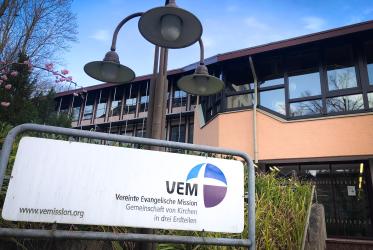Letter to Mr Jan Eliasson, President of the UN General Assembly, 21 March, 2006
Your Excellency,
We write to you on behalf of the World Council of Churches, a fellowship that
brings together 348 Protestant, Orthodox, Anglican and other churches representing
more than 560 million Christians in over 110 countries.
The Universal Declaration of Human Rights is now recognized as a fundamental
reference point for peoples around the world and provides the cornerstone of
human rights work. It was adopted in 1948, as a "common standard of achievement
for all peoples and all nations". The World Council of Churches, through the
Commission of the Churches on International Affairs, played a significant role in
the drafting of the Declaration, particularly the article on the freedom of religion
and religious liberty.
Over the years we, together with our members, have continued to contribute
and participate extensively in the work of the UN Commission on Human Rights.
In more recent times, we have been concerned by the developments at the
Commission that had virtually paralyzed its task as the highest international body
to oversee the work of promotion and defence of human rights.
It is with this background that the Ninth WCC Assembly, meeting in Porto
Alegre between 13 and 23 February 2006, has adopted a statement on UN Reform.
The Assembly "urged member states to avoid politicizing the composition of the new Human
Rights Council and give it a status within the UN architecture that reflects the central
importance of human rights as one of the three pillars of the UN system. Members of the
UN Human Rights Council must demonstrate through their policies, actions and domestic
and international human rights record a genuine commitment to the promotion and protection
of human rights, including the economic, social and cultural rights. Being a UN
member state or even a permanent member of the UN Security Council does not by itself meet
this criterion."
We have followed with keen interest the difficult negotiations on the formation
of the new Human Rights Council being carried on, under your leadership
as General Assembly President. Though the results of the negotiations may not
be ideal, given the present environment of tensions and suspicions amongst member
states and the need to seek compromise, we are of the considered opinion that
the draft you presented to the General Assembly was the best in the circumstances
and we are glad it has been accepted by the majority of the members. It does make
important improvements to the human rights architecture of the UN. Our fears
were that reopening the negotiations could have resulted in a setback to the gains
that have been made during the last five decades.
We therefore take this opportunity to congratulate and thank you in appreciation
for the hard work you have put in, despite some setbacks. The Human Rights
Council has now been given a practical shape and with the good will of the states,
we are convinced it will contribute effectively to the promotion and defence of
human rights. With this major step now behind us, human rights will occupy an
important place on the agenda of the United Nations.
Yours sincerely,
Rev. Dr Samuel Kobia
General Secretary





